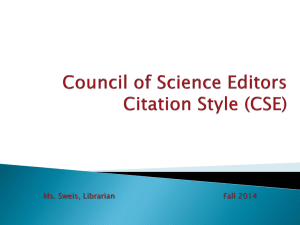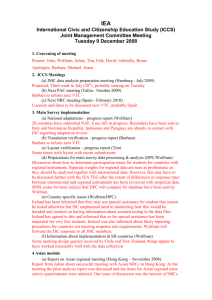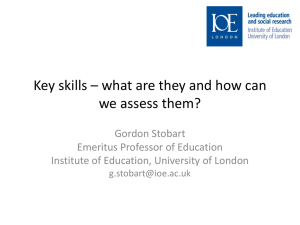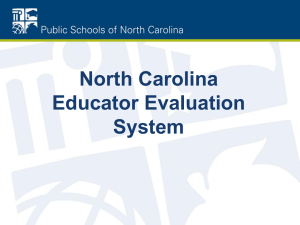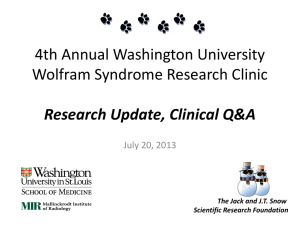Good scientific practice
advertisement
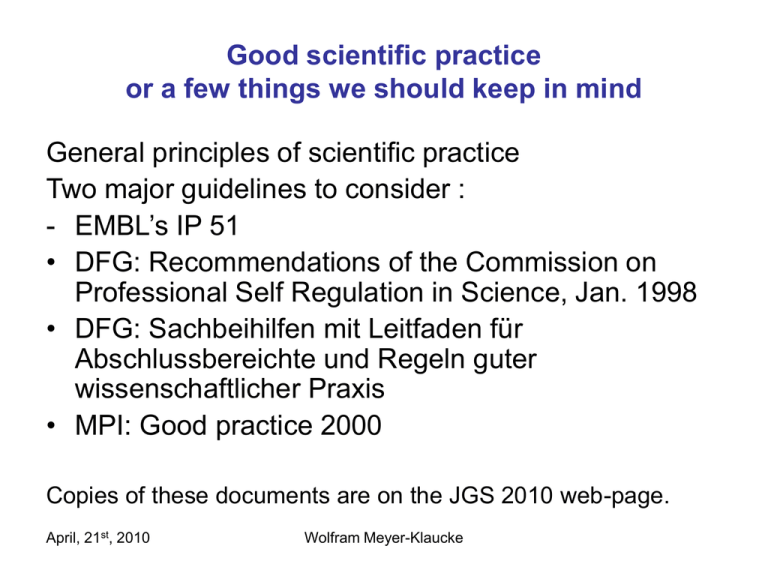
Good scientific practice or a few things we should keep in mind General principles of scientific practice Two major guidelines to consider : - EMBL’s IP 51 • DFG: Recommendations of the Commission on Professional Self Regulation in Science, Jan. 1998 • DFG: Sachbeihilfen mit Leitfaden für Abschlussbereichte und Regeln guter wissenschaftlicher Praxis • MPI: Good practice 2000 Copies of these documents are on the JGS 2010 web-page. April, 21st, 2010 Wolfram Meyer-Klaucke In submitting a proposal to the DFG, you agree to: 1. adhere to the rules of good scientific practice. In cases of scientific misconduct, the DFG may impose sanctions. Scientific misconduct is defined as the intentional and grossly negligent statements of falsehoods in a scientific context, the violation of intellectual property rights or impeding another person’s research work. The circumstances of each case will be considered on an individual basis. Depending on the nature and extent of the misconduct exposed, the DFG may: • issue a written reprimand to the person involved; • exclude those found responsible from the right to apply for DFG funds for a period of one to eight years, depending on the severity of the scientific misconduct; • revoke funding decisions (completely of partially revoke approvals and demand the return of authorized funds or the repayment of funds spent); • demand that those concerned either retract the publications containing false data, correct the false data (by publishing an erratum) or include a reference regarding the DFG’s retraction of funds in the relevant publication; • exclude those found responsible from acting as a reviewer or from membership on DFG committees; • deny those responsible the right to vote in DFG elections. April, 21st, 2010 Wolfram Meyer-Klaucke DFG: All institutions have to implement 8 rules: 1. Day to day scientific practice 2. Relations with colleagues and cooperation 3. Publication of results 4. Cooperation and leadership within working groups 5. Guidance of junior scientists 6. Securing and storing of primary data 7. Scientific publications 8. Appointing an ombudsperson April, 21st, 2010 Wolfram Meyer-Klaucke Day to day scientific practice • precise observance of discipline-specific procedures for acquiring and selecting data, • reliable securing and storage of primary data; clear and comprehensible documentation of all important results, • the rule of systematic scepticism: openness for doubt, even about one’s own results and about the results of one’s own group, • a realisation of tacit, axiomatic assumptions: watchfulness for any “wishful thinking” motivated by self-interest or other extrinsic factors including economic, political, religious or moral considerations; systematic alertness for any possible misinterpretation or over-interpretation, including overgeneralisation. April, 21st, 2010 Wolfram Meyer-Klaucke Relations with colleagues and cooperation • • • • • no hindrance of the scientific work of competitors, for example by delaying reviews or by passing on scientific results which have been acquired in confidence, active promotion of junior scientists’ scientific qualifications, openness to criticism and doubt expressed by other scientists and team colleagues, careful, non-self-interested and unprejudiced assessment of colleagues; avoidance of bias when appropriate, declaration of both commercial and scientific conflicts of interest. April, 21st, 2010 Wolfram Meyer-Klaucke Publication of results • • • • publication on principle of results obtained through public funding (principle of the public availability of the results of basic research), publication also of falsified hypotheses in an appropriate manner and admission of mistakes (principle of a science culture open to the possibility of error), strict honesty in the recognition and appropriate consideration of the contributions of predecessors, competitors and colleagues (principle of recognition) distribution to academic researchers of any materials (e.g. cells, DNA constructs) used in published experiments. Deposition of sequence, structural, and other relevant information in the appropriate public database on publication. April, 21st, 2010 Wolfram Meyer-Klaucke Cooperation and leadership within working groups The head of each EMBL Unit, in concert with the Scientific Director, is responsible for a proper organisation which ensures clear allocation, (…) monitoring, conflict resolution and quality control and guarantees that these tasks can in fact be undertaken effectively. Reproducibility. The more surprising, but also the more desirable a result is, the more important it is – as far as is possible with justifiable expense or effort – that the route to that result be confirmed within the research group before the results are passed on to the outside. Leadership • Full knowledge of all relevant circumstances • expertise in the field, presence and a broad perspective • If no longer possible – delegated in such a way that the leadership division remains manageable and effective April, 21st, 2010 Wolfram Meyer-Klaucke Guidance of junior scientists • • training and furthering of junior scientists guiding them in the observance of the principles of good scientific practice. These rules and regulations are integrated in the training provided by the EMBL PhD programme and need to be rigorously followed. April, 21st, 2010 Wolfram Meyer-Klaucke Securing and storing of primary data Primary data must, as far as possible, be stored for at least ten years from the date of publication on durable, secure carriers in the institutes or research establishments in which they arose Access to the data has to be granted to persons with a justifiable interest or, when appropriate, in a public data repository Full and adequate records must be kept for a minimum period of ten years as a source of reference, should the published results be called into question by others April, 21st, 2010 Wolfram Meyer-Klaucke Scientific publications Publications must adequately describe the results and the methods used, and give full and correct credit for own and third-party preparatory work Any findings which support or call into question the results presented should equally be made known Several originators • co-authorship requires significant contribution through the design of the studies or experiments, through critical and previously unpublished materials or procedures, through working out, analysing or interpreting the data and through preparing the manuscript • These persons also having agreed to its publication • Authors always bear joint responsibility for the content • Group leader carries ultimate responsibility • All publications that include group members as authors must therefore be approved by the group leader April, 21st, 2010 Wolfram Meyer-Klaucke Appointing an ombudsperson A person who becomes aware of any significant indication that scientific misconduct within the meaning of the catalogue of misconduct (Appendix 1) has occurred has the responsibility of notifying the Director or the Coordinator of the EMBL Unit concerned, who in turn must notify the DirectorGeneral in writing. If the Unit Coordinator is himself/herself implicated in the enquiry the Director-General should be notified directly. April, 21st, 2010 Wolfram Meyer-Klaucke Can we prevent willful misconduct? We have to try as hard as possible! Measures: • Good lab books • Reproducible results (check!) • Retain skepticism • Discuss surprising results with your colleagues – – • • • • • • • • Results are surprising as well, if they fit your expectation to 100% Check statistics (Tailored numbers can be detected (preference for certain digits)) Check quality of publications prior to starting a collaboration (read publications, do not trust impact factors) How many publications can a person write and be responsible of per annum? Store (raw) data Explain data analysis in the publication. Some examples: “Based on these considerations … were varied in the quantitative …analysis” “Anyhow, typical error margins in … are on the order of …” “These results are consistent with, but not proof of, the possibility that “ “reveals … in both samples” Focus on the long term pay-off April, 21st, 2010 Wolfram Meyer-Klaucke
